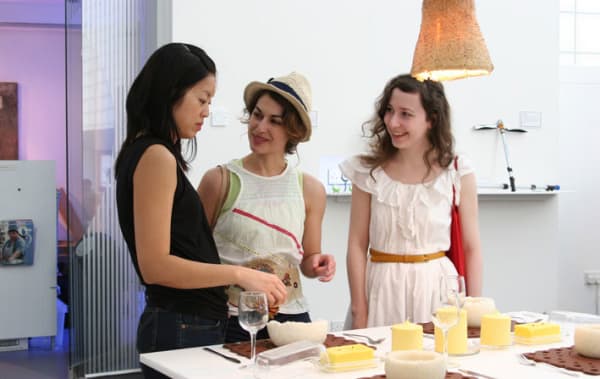If you’re thinking of going on exchange or work placement abroad while at UAL, it's important to think about the costs involved. It's important to ensure you can support yourself financially while abroad, irrespective of whether you receive grant funding support or not.
Read more about the types of costs to consider, how you might budget for your exchange or work placement abroad, and what your tuition fees will be while you’re away.
Explore and apply for funding opportunities that could help you pay for your exchange.
Funding opportunities
Explore the opportunities below and apply for help to pay for your exchange. Funding is not guaranteed and will not cover all costs.
Turing Scheme
Funding for 2025/26 exchange and work placements abroad
The Turing Scheme is the UK Government’s programme to enable students to study or work abroad.
Funding is not guaranteed. Due to limited funding capacity, the application for the Turing Scheme grant will be competitive and we may not be able to fund all applicants who apply for grant funding.
Successful applicants can expect to receive a cost-of-living grant. If you also meet the Turing Scheme’s disadvantaged background criteria:
- you'll receive a travel grant (on top of the cost-of-living grant). The grant covers direct costs of travel for one return journey to and from the placement destination including transfers, up to a maximum threshold identified by the Turing Scheme travel grant funding.
- you can apply for additional funds to cover costs related to insurance, visas and passports, as well as Special Educational Needs (SEND) support. You’ll need to prove your expenses, so make sure to keep all your receipts.
How we decide who to fund
Students who meet the below criteria can apply for the Turing scheme funding:
- you have a confirmed study or work placement of a duration of at least 14 days and no longer than 1 year. Funding will cover mobilities starting from 1 September 2025 to 31 August 2026.
- If your mobility is a duration of 14 days a minimum of 10 days must be studying or working at your placement.
- You are completing a full time degree at UAL.
- meet any other criteria as outlined by the Turing Scheme.
- Are not in receipt of an alternative mobility grant such as Student Finance England’s (SFE) Travel Grant for students studying abroad. Please note if you receive the SFE student loan or grant you are still eligible to apply.
Priority groups
All students completing an exchange or work placement abroad as part of the Diploma in Professional Studies (DPS) year are eligible to apply. However, preference will be given to those who fall into our priority groups. We'll allocate funding in order of:
1) Students from disadvantaged backgrounds as defined by the Turing Scheme:
- Your annual household income is £50,000 or less.
- You’re receiving Universal Credit or income-related benefits because you’re financially supporting yourself, or yourself and someone who is dependent on you and living with you. For example, a child or partner.
- You’re a care leaver and or you’re care experienced.
- You have caring responsibilities.
- You’re estranged from your parents.
- You’re a refugee or an asylum seeker
- Students from most deprived areas according to Index of Multiple Deprivation (Quintile 1 and 2).
2) Students who do not meet the disadvantaged background criteria who are completing an exchange programme or unpaid placement.
3) Students who do not meet the disadvantaged background criteria, who are completing a paid placement.
How to apply
- Get your exchange or work placement approved by your UAL College or Institute.
- Then ask your exchange mobility officer or placements team for the application form. Or email internationalmobility@arts.ac.uk for further information.
Student Finance England (SFE) travel grant
This helps with the costs of your travel to and from your host institution. Apply if you’re receiving the Standard Turing grant (non-disadvantaged).
If you’re receiving the additional top up (disadvantaged) you may be able to apply, if your travel costs are not covered by the entirety of the Turing travel grant.
Find more information and apply for travel grants for students studying abroad.
BUTEX Study Abroad Scholarships
Each year British Universities Transnational Exchange (BUTEX) awards a number of scholarships. They fund students participating in exchange programmes, summer school programmes or overseas work placements.
To be eligible to apply you must:
- have been offered, be currently undertaking, or have already completed, a study abroad or exchange placement or a work/internship/traineeship placement.
- apply in the same calendar year that your study abroad, exchange or work placement takes place.
- be enrolled in your undergraduate course when you apply.
- either: undertake your study abroad placement for a specific length of time, - either one term or one year.
- or: undertake your work, internship or traineeship placement overseas. This does not need to be for a specific length of time.
Find out more and apply for a BUTEX scholarship.
The John Speak Language Trust
The Trust supports students to improve their language skills and to further the UK export trade.
Awards of £500-£2,000 are available. Gain a deeper understanding and knowledge of a language and culture to enhance your career prospects.
To be eligible to apply you must:
- be a natural born British citizen over the age of 18
- have a basic knowledge of a foreign language (GCSE minimum).
Find full entry criteria and apply online to the John Speak Language Trust.
Swiss European Mobility Programme (SEMP)
Students travelling to Switzerland can be supported via the SEMP.
Traineeships must be organised through a Swiss Higher Education Institution, usually a partner institution of your home university. You can find out more information from the International Relations Office of a Swiss partner institution.

Costs to consider
The costs of an exchange could include, for example:
- Travel (flights, trains, in-country transport)
- Visas (where applicable)
- Insurance and/or medication (where applicable)
- Accommodation (including deposits, rent and utility or other bills)
- Phone plans
- Administration fees (such as a registration fee at the host university or transcript fees)
You’ll also have the same types of general living costs as you do at UAL, such as groceries, eating out and socialising. You might need to buy study materials too.
Budgeting
There are ways to reduce costs abroad to make your exchange more affordable. Here are our tips. You may also want to speak to our Global Ambassadors for more advice.
- Work out your budget before you leave. Research costs in your host location.
- Consider using a currency card (eg. Monzo or Revolut). You could also open a bank account abroad to avoid currency costs.
- Consider getting a local SIM card for your phone. Or check if your current provider has 'roaming' costs.
- Accommodation. Will you share with friends? Could you do a 'homestay'?
- Investigate which funding opportunities and scholarships you’re eligible for. Remember these are not guaranteed.
Tuition fees and funding
Students do not pay tuition fees to the host university but you’re responsible for all other costs.
You’ll continue to pay tuition fees to UAL. If you’re completing a work placement for the full academic year, your tuition fee will be reduced. The amount of your reduction will depend on a variety of factors related to your placement abroad. Contact the Student Advice Service for more information.
Home students can continue to use Student Finance to pay tuition fees. International students using loan companies should check with the loan company.
It’s possible that your funding will also change if you go on an exchange. You'll need to tell Student Finance that you will be studying abroad. They'll assess how much loan you can get. Your loan amount is dependent on your location of study and the local cost of living. This can mean you would get less of a maintenance loan than you would if you were to continue living in London.
You can reach out to the our Student Advice Service for further information on how your Student Finance loan or grant may be impacted by your exchange or work placement abroad.
Related links
-

Maria Magalhaes (BA Graphic and Media Design, London College of Communication, 2024)
-

Erasmus students at UAL. Image courtesy of UAL.
-

Central Saint Martins student Eva Xiste on her placement in Switzerland | image courtesy of UAL